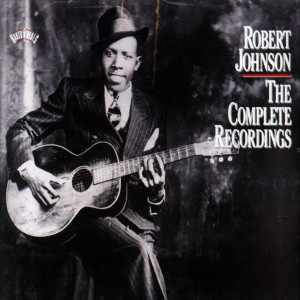
Published on Sep 28, 1997
Eric Clapton would have hated me back in 1990.
You see, that was the year that the ultimate collection of
recordings from legendary bluesman Robert Johnson,
The Complete Recordings, was released. Clapton has stated in
many interviews – and even in the liner notes for this collection –
that Johnson was the biggest influence on his music. But the first
time I listened to it, I couldn’t say I was impressed – thus I
would have earned Clapton’s disdain.
But recently, while strolling the Pierce Memorial Archives
(where earplugs are more than a fashion statement, they’re part of
daily wear), I stumbled upon my copy of
The Complete Recordings – on vinyl, no less. I don’t know
why I chose to dust it off again – but I’m sure glad I did.
Johnson’s legend spread after his death in 1937 – some say that
Johnson had sold his soul to the Devil in exchange for his gift of
music. (I say this was impossible, as Bill Gates was not even…
oh, never mind.) Johnson’s output could not be called massive in
any language – the whole remaining body of his work is 41 takes of
29 songs. But it is the quality of this music that is important –
something that can be heard even through the primitive recording
conditions that brought 78’s to life.
I would dare to say that any classic rock fan has been touched
in some fashion by Johnson’s music. Clapton has covered him on many
occasions, as have the Rolling Stones. But listening to Johnson on
these three records, one has to admit he was a pioneer in the blues
field.
The recordings feature only Johnson and his guitar – but the
glorious noise they produce on the well-recorded tracks is amazing.
Keith Richards said in the liner notes that he thought there were
two guitarists the first time he heard Johnson’s music – and it
sometimes seems amazing that the six-string work is all coming from
one man at one time.
And Johnson – despite taking traditional timing and metering and
throwing them out the window – knew how to craft a blues
masterpiece. Songs like “Sweet Home Chicago,” “Come On In My
Kitchen,” “I Believe I’ll Dust My Broom” and “Cross Road Blues,”
despite being covered numerous times over the years in various
incarnations, have never sounded as sweet as when their author
performed them.
Sometimes, when listening to cuts like “Hellhound On My Trail,”
“Me And The Devil Blues” or “Cross Road Blues,” one can’t help but
wonder about the stories regarding Johnson’s unearthly deal. For
someone so young, Johnson did seem fascinated by supernatural
encounters and times of despair and decision regarding one’s life.
But when you think that everything is whiskey and tears, Johnson
pulls out a song like “They’re Red Hot,” which is more jazz than
blues, and is a wonderful change of pace.
I think that one thing which originally deterred me from
The Complete Recordings was the fact that I kept hearing
different versions of songs back to back. Seven years after I
originally listened to it, I realize two things. First, it wasn’t
like there were eight different takes of the same song on one
record; there are no more than two different takes of any song
here. Second, and more importantly, each different take recealed
something different about the track. Maybe it was taking the tuning
up or down a half-step, maybe it was a little better production (or
better diction), maybe Johnson’s heart was more in that take. It is
an interesting piece of history to listen to.
The only negative point I have with the album, ironically, is
something which can’t be controlled – and that is varying sound
quality of the tracks. I know I should be thankful that many of
these tracks have survived this long after Johnson’s death. But
there are a few tracks here which have very poor sound – possibly
the reason why there was more than one take done on those songs.
(Not all the cuts that appear twice suffer from this.) The fact is
recording technology in 1997 is much different than what existed in
1936, when the bulk of these tracks were recorded. Had Johnson not
been poisoned in 1937, I think he would have been able to reap the
benefits of new recording technologies as they were born.
The Complete Recordings is not only a must-own for anyone
who is a diehard blues enthusiast, it’s a wonderful starting place
for those who wish to discover why the blues is such a pure and
powerful medium. It’s a nice thing for rock music fans to hear, if
only to discover how some of their favorite tracks started out.
And, it is
the Robert Johnson release to own.